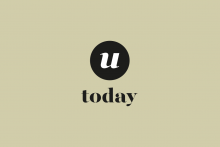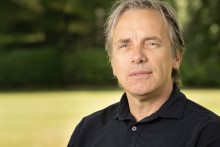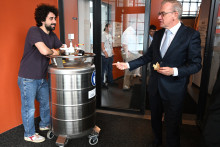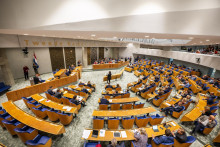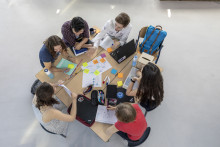Edward Adkomaning, a graduate of Cape Coast Polytechnic, said, `As a PhD at the UT, my purpose is to bring back knowledge to empower the technical institutions- especially its students and lecturers- by building capacity and increasing competency levels in African schools. A whole social network can be brought together to improve education.'
At the opening of the renovated Waaier building, Afkomaning, who is a young-looking 49, sat on the modern red leather chairs, reflecting on the past four years. He began taking courses in a one-year master's program called `Educational Management Evolution Assessment,' studying in the Faculty of Behaviourial Science. `We were five Ghanaians who came in 2006 to participate in the master's program. On the basis of our performance, we were able to continue to the PhD level, otherwise I would have been back to Ghana a long time ago,' said Akomaning, whose wife and three children still live back in Ghana.
As a born-teacher, his arms gestured to add emphasis to his point: `Yes, for Ghana there are many challenges. First and foremost, the emphasis lies on building curriculum, focused on the Polytechnic lecturers, but I cannot concentrate only on the lecturers because students are being trained for the world of work. Industry and government also cooperate in the bigger picture.'
The researcher studied ways of developing curriculum material, designed to be all-embracing, regardless of the layer of society, everyone is involved in the educational process and everyone is a contributor. The work of the teacher cannot be overemphasized when worldwide teachers only contribute to 30 percent of what is being learned by students, according to a 2003 study.
As a member of the study association Dimensie, he finds it easier said than done to have a rousing social life. He and other African friends, many with families back home, have contemplated starting an African Student Association, but they found the rigorous demands of the academic program `quite stressful' and compacted in a short period of time. `You come with your data, and you need to analyze the data. We were required to travel back and forth to Ghana, and at the end of the day, you need to set your priorities.'
He knows his country holds promise, and said, `We have lots of laws in Ghana, but laws don't bite. Curriculum design and the implantation of change is a key factor to progress, but it is a gradual process and that doesn't happen overnight.'
Adkomaning plans to retour to his native Ghana in early March, bringing with him knowledge from the west to help lay the groundwork for capacity building at Cape Coast Polytecnic and other technical schools in the region.
His silver cuff links sparkled, while he calmly sipped a cup of tea and remarked: `My research work is all about collaboration and developing teacher-designed teams. How can teachers come together to design a particular program and solve a particular problem?
 |
| At the opening of the Waaier building last month, one student negates the language barrier. ‘I got a letter to attend the opening, and even though I don’t speak Dutch and can’t understand the speeches, it’s good to see with your eyes what is happening at the university,’ said Ed Adkomaning. (Foto: Arjan Reef) |


